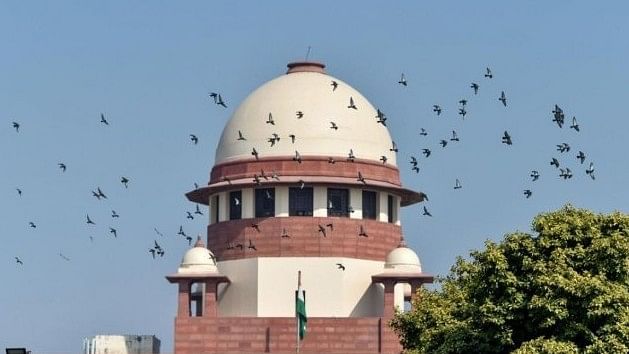
Supreme Court of India.
Credit: PTI File Photo
The Supreme Court on Wednesday decided to place before a seven-judge bench for reconsideration its 1998 judgement in the P V Narasimha Rao case, also known as 1993 JMM bribery case, which granted immunity to MPs/MLAs from prosecution if they accepted bribes and voted or asked a question in a particular manner.
A five-judge Constitution bench led by Chief Justice of India D Y Chandrachud said this judgement will be reviewed by a seven-judge bench.
“It must be noted that purpose of Article 105(2) and Article 194(2) of the Constitution is to ensure that the Members of the Parliament and state legislatures are able to discharge their duties in an atmosphere of freedom without fear of consequences which may follow, for the manner in which they speak or exercise their right to vote on the floor of the House,” the bench said.
The top court said the object of the constitutional provisions clearly is not to set apart the members of the legislature as persons who wield higher privileges in terms of immunity from the general criminal law of the land, which citizens of the land do not possess.
The bench, also comprising Justices A S Bopanna, M M Sundresh, J B Pardiwala, and Manoj Misra, noted that the members of legislature must be free to express their views on the floor of the House without fear of consequences.
“Prima facie, at this stage, we are of view that correctness of the view of majority in P V Narasimha Rao should be considered by a larger bench of 7-judges,” the bench said.
The bench said that in the course of the judgement in the Narasimha Rao case, Justice S C Agarwal noted that if the construction in support of the immunity under Article 105(2) for a bribe taker were to be accepted, a member would be liable to be prosecuted on a charge of bribery if he accepts a bribe for not speaking or not voting for a matter under consideration before the House. The top court, however, said he would enjoy immunity from prosecution for such a charge if he accepts a bribe for speaking or giving his vote in Parliament in a particular manner.
The bench said the judgement of Justice Agarwal states that the offence is complete with the acceptance of the money or agreement to accept money being concluded and is not dependent on performance of the illegal promise by the receiver. It further added that this aspect had not been dealt with in the judgement of the majority.
“For these reasons, we're of the view that the correctness of the view of the majority in Narasimha Rao shall be considered by a larger bench of seven-judge bench," the bench said.
Attorney General R Venkatramani and senior advocate Raju Ramchandran, appearing for Sita Soren, contended facts of the present case do not require the court to go into correctness of the Narasimha Rao case.
On March 19, 2019, the Supreme Court ordered to set up a larger Constitution bench to decide if a lawmaker can take refuge under immunity clause to avoid criminal prosecution for voting in Parliament or a state Assembly after taking bribe from some beneficiary.
The court had said the matter was of "substantial public importance" and involved the "issue of wide ramifications".
In 1998, a five-judge Constitution bench in the P V Narasimha Rao versus CBI case, had held that parliamentarians had immunity under the Constitution against criminal prosecution for any speech made and vote cast inside the House.
Two judges on the bench had then taken the view that the protection under Article 105(2)/194(2) of the Constitution and the immunity granted cannot extend to cases where bribery for making a speech or vote in a particular manner in the House is alleged.
The majority view, while acutely conscious of the seriousness of the offence, felt that the wrongful act and the “sense of indignation” of the bench should not lead to a narrow construction of the constitutional provisions which may have the effect of impairing the guarantee to effective parliamentary participation and debate.
More than two decades after, a similar question arose before the top court as Sita Soren, JMM chief Sibu Soren's daughter-in-law, questioned her prosecution on charges of bribery during the Rajya Sabha elections of 2012.
She challenged validity of Jharkhand High Court's judgement of February 17, 2014, allowing her prosecution and declining to quash the order on taking cognisance of the bribery charge.
In her case, the high court noted, according to allegations, Soren did take money from one R K Agarwal but did not cast her vote in his favour, so she cannot claim any immunity.
Her act in Assembly of casting vote "will have no nexus with the alleged conspiracy and agreement under which she had received money", the high court said.
According to Article 194(2) of the Constitution, "No member of the Legislature of a state shall be liable to any proceedings in any court in respect of anything said or any vote given by him in the Legislature or any committee..."
Article 105(2) of the Constitution stated, "No member of Parliament shall be liable to any proceedings in any court in respect of anything said or any vote given by him in Parliament or any committee thereof."
In her plea, Soren sought a direction to nullify the criminal prosecution launched against her on a claim of immunity under Article 194(2) of the Constitution.
